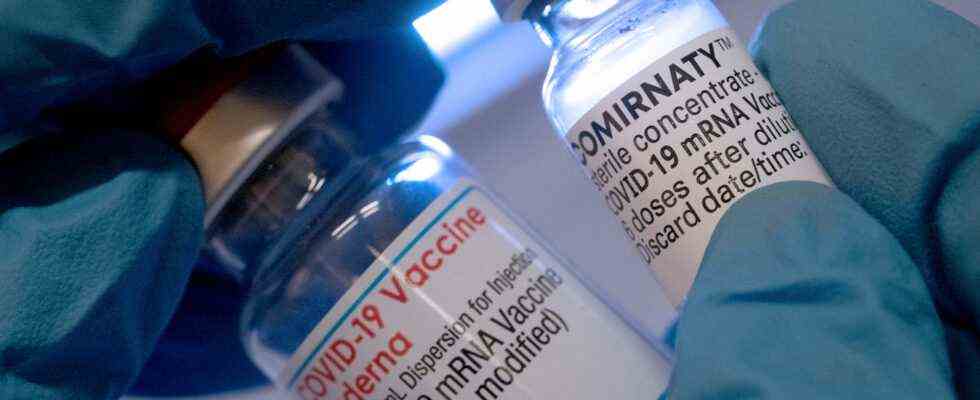Status: December 15, 2021 8:21 p.m.
According to Health Minister Lauterbach, the vaccine could become scarce at the beginning of the year. The budget committee therefore approved 2.2 billion euros for replenishment. The opposition sees this as alarmism.
Because, according to his findings, there is a risk of a vaccine shortage at the beginning of the year, Federal Health Minister Karl Lauterbach wants to procure 92 million more doses for the coming year. 80 million BioNTech units are to be procured through EU contracts, and a further twelve million cans are to be purchased directly. The ministry announced. According to Federal Finance Minister Christian Lindner, Moderna vaccine is also included. The budget committee in the Bundestag released funds totaling 2.2 billion euros.
Lauterbach said on Tuesday evening that there was probably too little vaccine for the beginning of next year. He referred in the daily topics to an inventory of the stocks after his handover last week. It came to the conclusion that the reserves and orders for January to March are insufficient. Doctors reacted with alarm to the message.
Health Minister Lauterbach admits insufficient vaccine stocks for the beginning of 2022
Hanni Hüsch, ARD Berlin, daily news 8 p.m., December 14, 2021
Omikron and mandatory vaccination for health workers
Lauterbach emphasized that the new Omikron virus variant posed major challenges. “For quick booster vaccinations and possible omicron vaccinations, we need more vaccine quickly.” Lauterbach left it open as to how many extra cans will be needed when and for what. First and foremost, it is a matter of starting the year sensibly, explained the ministry – and then also for the whole of the first quarter.
Several aspects, some of them new, are to be brought together in the planning: continued broad booster vaccinations with a view to Omikron, but also replenishment for the mandatory vaccination requirement for staff in nursing homes and health facilities as well as a possible general vaccination requirement.
The timetable until the end of the year is largely clear: Chancellor Olaf Scholz confirmed the goal of up to 30 million first, second and booster vaccinations. Of these, 19 million were made. Ex-Health Minister Jens Spahn had also assured that this goal would not fail because of the vaccine and organized extra deliveries for it. As of Monday, almost 19 million cans delivered by BioNTech and Moderna had not yet been reported as used, according to the ministry. In the two weeks from December 20, a total of 22 million cans are to be delivered.
Inventory balance “fatal signal”
According to current plans, the most important supplier BioNTech should deliver twelve million doses every month in the first half of the year, divided into adult and children’s vaccines. In fact, the long stalled vaccination campaign is running at a record speed of more than six million vaccinations in one week. More replenishment may be required to maintain a similar level.
The head of the National Association of Statutory Health Insurance Physicians (KBV), Andreas Gassen, called the news of the shortage of vaccines a “fatal signal”. The German Foundation for Patient Protection asked Lauterbach to put the facts on the table immediately.
“Instead of making responsible provisions, the previous government is leaving empty storage facilities,” was the criticism from FDP health expert Christine Aschenberg-Dugnus. Labor Minister Hubertus Heil (SPD) called the deficiency identified by Lauterbach on ZDF “seriously irritating”. The predecessors had obviously “not made the ship clear”.
Union sees no cause for concern
The Union sees it differently: For his party colleague Spahn, the new health policy spokesman Tino Sorge (CDU) jumped into the breach. “Karl Lauterbach calls fire to then play the fire brigade – although he knows that there is no fire,” he wrote in a letter to his group colleagues. This is “a transparent political maneuver to remove the SPD from the grand coalition”.
In the first quarter of 2022, more than 16 million doses of BioNTech and Moderna are expected per month, explained Sorge. This is enough to be able to have first and second vaccinations in a good twelve million unvaccinated adults. In December, Spahn himself showed that more supplies can be organized at short notice – for example with early deliveries from the manufacturers or the takeover of cans that other EU countries are currently unable to use.
Vaccine deficiency? Ministry of Health does not give any specific figures
Markus Sambale, ARD Berlin, December 15, 2021 12:57 p.m.

